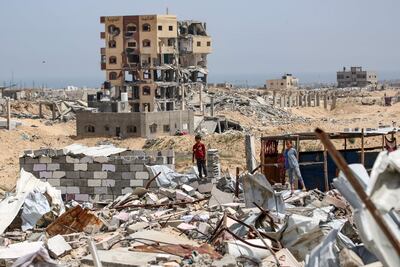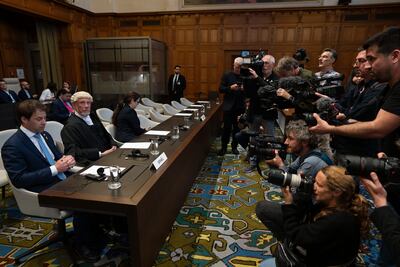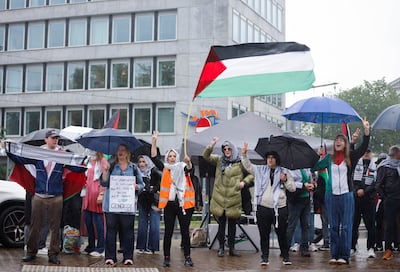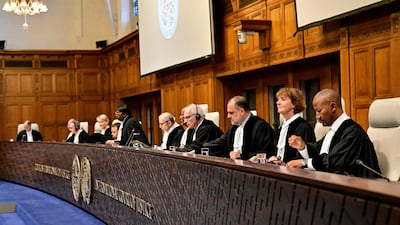Live updates: Follow the latest on Israel-Gaza
The International Court of Justice ordered Israel on Friday to stop its attack on Rafah, in a landmark ruling that cited the “immense risk” to Palestinians in Gaza.
By 13 votes to 2 the court said Israel must “immediately halt its military offensive” in Rafah, the last refuge in the south of Gaza for about a million displaced people.
It is the court's most drastic order to date in a genocide case brought by South Africa and is sure to pile pressure on Israel over its seven-month war in Gaza.
Hamas and the Palestinian Authority welcomed the ruling, while an Israeli minister said stopping the war would mean Israel deciding it should “cease to exist”.
South Africa called the order “ground-breaking”. The EU's top diplomat said Europe would have to choose between supporting Israel and "institutions of the rule of law".
Judges also ordered Israel to open the Rafah border crossing for aid and refrain from any action that would lead to the “physical destruction” of Palestinians as a group.
They said fact-finders must be allowed into Gaza to investigate allegations of genocide – which Israel denies – and preserve evidence.
Reading the decision in The Hague, court president Nawaf Salam of Lebanon said “exceptionally grave” events in Gaza required a new order after an emergency request by South Africa.
Judges are “not convinced that the evacuation efforts and related measures that Israel affirms to have undertaken” are “sufficient to alleviate the immense risk” to Palestinians in Rafah, Judge Salam said.
He said Israel “has not provided sufficient information concerning the safety of the population during the evacuation process”.

The 15-judge bench stopped short of granting South Africa's last-minute request for an Israeli ceasefire across the whole of Gaza.
Israel is unlikely to comply with the Rafah order as it advances deeper into the city and intensifies its bombardment across Gaza.
Troops entered Rafah on May 7 despite massive pressure from the US and other world powers not to go ahead with a large-scale ground offensive.
South Africa filed a new request on May 15 in a case that had previously led to more vague orders for Israel to prevent genocide.
It told the court in hearings last week that Rafah was part of an “endgame” in which Gaza would be “utterly destroyed” as a place of human life.
Israel replied that it entered Rafah to bring down a “military stronghold for Hamas” and told the court “any state would do the same”.

The court said the situation had changed since its previous orders due to the offensive in Rafah and “resulting repeated large-scale displacement of the already extremely vulnerable Palestinian population”.
In its 18-page ruling it said there was a “real and imminent risk” of Palestinian rights being harmed before judges can rule on the genocide question.
Israel-appointed Aharon Barak and Uganda's Julia Sebutinde were the only dissenting judges.
Judge Barak said the court was under “great pressure” to act but “cannot be bothered by political, military or public policy troubles”.
He interpreted the court's order to halt the “offensive” as meaning that Israel need not end all military operations and could still take defensive action in Rafah.
Judge Sebutinde said the court should have considered a “broader context” of threats faced by Israel on multiple fronts.

Germany's Georg Nolte said he voted with the court “with considerable hesitation” as he warned the court should not “overstep its limits”.
South African foreign ministry official Zane Dangor said the order was “de facto calling for a ceasefire” as he welcomed the court's decision.
“This order is ground-breaking as it is the first time that explicit mention is made for Israel to halt its military action in any area of Gaza,” he said.
The ICJ case is separate to an investigation into Israeli and Hamas leaders at the International Criminal Court, which also works from The Hague.
The chief prosecutor at the ICC, Karim Khan, is seeking arrest warrants for Israeli Prime Minister Benjamin Netanyahu and Defence Minister Yoav Gallant, and Hamas leaders Yahya Sinwar, Mohammed Deif and Ismail Haniyeh.


